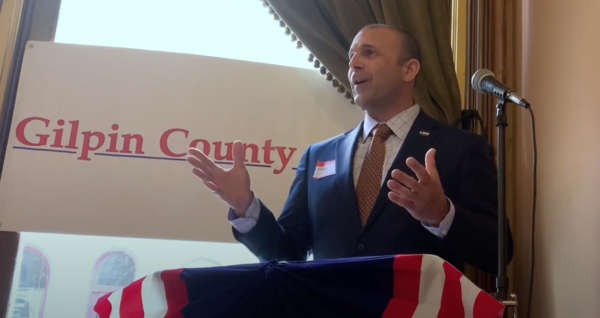Widgetized Section
Go to Admin » Appearance » Widgets » and move Gabfire Widget: Social into that MastheadOverlay zone
Roberts defends health insurance programs as Solomon targets ‘tax-payer funded healthcare’

With open enrollment for the thousands of Coloradans on the individual and small-group health insurance markets kicking off Tuesday, state Rep. Dylan Roberts of Avon is touting years of work, mostly by Democrats, to bring down costs in the state’s underserved rural areas.
Recently announced statewide cost increases would be way worse without state and federal efforts, Roberts contends, and can be offset and significantly reduced by shopping around and taking advantage of the recently extended federal subsidies in the Affordable Care Act (Obamacare).
By contrast, Roberts’ Republican opponent for the critical northwest Colorado state senate seat in the Nov. 8 election – Matt Solomon – says “government has no business being in business” when it comes to healthcare, and he’s generally a believer in the idea that “tax-payer funded healthcare should be abolished in all forms.”
In a candidate evaluation on the Christian election website ivoterguide.com, which claims to be “Grounded in God. Rooted in Research”, Solomon, a businessman and former Eagle Town Council member, was asked the following question on healthcare:
“What most closely matches your view on healthcare: A) Healthcare for all should be guaranteed and funded by the government with no private healthcare option. (includes “universal healthcare,” “Medicare for all,” etc.) B) Healthcare insurance funded by the government should be available for all who want it, along with private healthcare options. C) Medicaid and Medicare should remain available, but no other taxpayer-funded programs are necessary. D)Tax-payer funded health care should be abolished in all forms, and Medicaid and Medicare should be de-funded.”
Solomon replied: “I fall somewhere between C and D. I am a believer in D; however, I am not opposed to C. I feel that the government has no business being in business, yet, at the same time, I see the value in Medicaid and Medicare and am not opposed to keeping it in place, so long as we monitor it for abuse.”
Asked by email to clarify his statement on the questionnaire and whether he would like to see Obamacare repealed at the federal level and therefore end the state’s expansion of Medicaid that greatly reduced the number of uninsured Coloradans in recent years, Solomon did not respond. Nor did he respond to questions about the state’s reinsurance program or public option.
Roberts sent a lengthy email response to questions about recent rate increases and overall efforts to reduce health insurance and healthcare costs on the Western Slope, which used to have some of the highest rates in the state and the least amount of competition:

“Ensuring that every Coloradan has access to an affordable, high-quality health insurance plan has been and will always be a priority for me,” Roberts wrote. “Thanks to bills we’ve passed at the legislature including reinsurance, the Colorado Option, and prescription drug price controls, most Coloradans who shop for insurance this fall will have access to more choices and increased savings when combined with the ACA tax credits that were just extended by the IRA [Inflation Reduction Act]. I encourage everyone to shop around and utilize the assistance that exists to bring their costs well below the state average and realize savings from what they paid last year. For example, folks in the high country could realize up to 38% in savings compared to last year thanks to the subsidies and reforms passed in Colorado. When I took office in 2018, Eagle County and the high country had the highest insurance costs in the country, lacked any choice or competition, and we were seeing 40%+ price increases year after year. We’ve ended that and it’s resulting in massive savings and thousands more Coloradans gaining access to the security of insurance coverage.”
Open ACA enrollment on the Connect For Health Colorado website starts Tuesday, Nov. 1.
The so-called “entitlements” of federal government programs such as Social Security, Medicaid coverage for lower-income Americans and Medicare for seniors have recently been a hot midterm election issue. House Minority Leader Kevin McCarthy — a California Republican and the presumed Speaker of the House if Republicans regain control – has said he’ll use the debt ceiling debate to slash funding for those popular programs. Roberts calls such talk “dangerous”.
“It is truly shocking to hear that people running for office support something as dangerous as eliminating Medicare,” Roberts said. “While this is a federal program not controlled by the state legislature, it should be a huge red flag, and I hope every Colorado senior is aware of that perspective as that would be devastating to the security of seniors in state and country. Further, eliminating Medicaid, which is governed, in part, by the state legislature would hurt the most vulnerable in the state and push thousands of Coloradans into poverty and without care. Finally, repealing the work the legislature has done over the last few years would be incredibly harmful. For example, the data released this week showed that without reinsurance and the Colorado Option, insurance prices would have increased by over 42% statewide instead of the projected 10% and no subsidies would be available to help Coloradans save money on insurance. I have not heard any plan at all from the other side as to what they would replace our reforms with other than returning us to where we were in 2018, which was not working for families and individuals here in Colorado.”
Consumer advocates continue to point to insurers and hospitals for failing to do more to bring down costs.
“After several years of fairly stable health insurance prices, Colorado consumers are going to feel these increases, especially in the rural areas,” Mannat Singh, Colorado Consumer Health Initiative executive director, said in a press release. “Insurers and hospitals are not making enough of an effort to meet the required reductions for some Colorado Option plans, but are instead setting a baseline for failing to hit the targets without reasonable justification.”
Singh points to research showing rates would be 32% above and beyond next year’s increase without reinsurance.
“Health insurance continues to be unaffordable for too many Coloradans, despite reinsurance moderating premium prices and additional plans being offered in more counties,” Singh said. “Premium rates must be reasonable and justified – the industry shouldn’t use the ongoing pandemic or inflation to hike company profits.”
Editor’s note: This story first appeared on the Colorado Times Recorder website.


